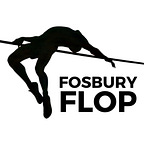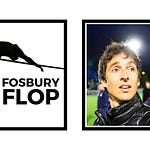You can enjoy this blog post by listening the podcast episode, or you can read it here, whichever is more convenient for you.
YouTube | Spotify | Apple Podcasts | iVoox | Google Podcasts | Amazon Music
“First ethical rule: If you see fraud and do not say fraud, you are a fraud.”
―Nassim Nicholas Taleb
Few days ago, I saw a video of Sanyo Gutiérrez —one of the best players in history of padel— running quite fast in the treadmill.
Padel is a sport played in a 20x10m court in which each pair can move in its square of 10x10m and a bit more of space outside of the court. I was amazed to see players who can run at very different speeds and a maximum of 14m in a straight line performing that exercise. I had serious doubts about the transfer of the exercise to real situations.
I didn’t have even 1% of the information that Sanyo’s coach has... and that exercise could be more than justified in that context. But... I couldn’t find —even imagine— a single reason. I think that, training hard, I can easily run more distance and faster than Sanyo in the treadmill… but that won’t help me beat him in a padel match at all.
Was it really a beneficial exercise even though I didn’t understand it? Was it a case of iatrogenics, how passionate we coaches are about hyper-interventionism? Full of doubts, looking for answers and also a bit of buzz… I posted a thought on Twitter about it.
What surprised me the most was a reply that said: “They are supported by professionals that tell them what exercises to do and which ones not to do.” I got a little scared because my mind interpreted it as a “you don’t have a fucking clue, so let the professionals do their job and don’t question them”.
The Spanish waterpolo team of Barcelona ’92 did a training camp based on the following daily plan: 1h30’ of lifting weights, 12km swimming with a shirt or weights in the waist, 1h of gym, 1h30’ of a soccer match and another waterpolo training session. Those athletes were also supported by professionals that told them what exercises to do or not to do. Specifically, by the Croatian Dragan Matutinovic. At the Olympics they won the silver medal. Many members of that team say that, in truth, they lost the gold.
When Luis Enrique and his technical staff arrived for the first training on the AS Roma locker room, they were also surprised at how normalized nonsensical practices can be. Their plan was to start with a normal football training session, but all the players were waiting the coaches with running shoes. The previous coach made them used to run sets of 400m around the athletics track of the Olympic Stadium before starting every training session. They were also supported by professionals that told them what exercises to do or not to do.
Lots of things that today seem wild or meaningless, in the past were considered normal. In fact, they were prescribed by professionals who —it was assumed— knew which exercises to do and which ones not to do.
They say that “science evolves from funeral to funeral”. Sport, does it too. If we don’t question the present, we eliminate the opportunity for better practices in the future. This seems that is the task of the “monkeys”, of the status quo protectors... those who, when you question something, answer you with a: “They are supported by professionals that tell them what exercises to do and which ones not to do.” Gustav Mahler said that “tradition is not the worship of ashes, but the preservation of fire”. The status quo protectors misunderstood him and began to put out the fire and preserve —and worship— the ashes.
An example is Coach Jeff Bell. In theory, he knows what exercises to do and which ones not to do... because he has won multiple state championships. The reality is that he is teaching birds how to fly. The performances are great but, the truth is, they have nothing to do with how basketball is played. Credibility must be given to you by the success of your present interventions, not by what you have achieved in the past. Could it be that you have a lot of talent as a leader and zero knowledge about motor skills or task designer? How many coaches like you have done the drills and lost? Which players did you train? Who were the rivals? How did the randomness affect? My grandmother might have won it too. If you need to say that you have won multiple state championships to justify what exercises you do... isn’t something missing in the practice? He thinks he is designing basketball drills but, at most, I would dare to call them “Physical Education tasks”.
“But in all my experience. I have never been in any accident […] of any sort worth speaking about. I have seen but one vessel in distress in all my years at sea. I never saw a wreck and never have been wrecked nor was I ever in any predicament that threatened to end in disaster of any sort.”
—Edward J. Smith, 1907, Captain of Titanic
Another example are tennis coaches and their devotion to perform exercises far away from the essence of the game. Put the player to hit the ball cross-court the whole training hour. No competition, no decision-making. Just by repeating the “technique” and believing that he is automating it. He will be a good player in the exercise but not in the sport. Don’t ask yourself what the hell is going on in the match. Why does he play so crazy? How could he decide so badly? If you have had him all week hitting a ball with a racket, but at any moment he played tennis.
My favorite is the “Pintus method” —how good it sounds! “European champion physical coach”... wow! How many have followed the same method and made a mess? What a great professional, I’m sure he knows what exercises to do and which ones not to do. Do they use the achievements in his resume to cover his team’s 6 injuries in 46 days this August? 3 to the surgery room and 3 in the biceps femoris. At one injury per week. But... more intensity is better performance, for sure! Does he still remain in love with making his players suffer? Is he still applying his PhD in athletics —marathon, specifically— in football training? I’m not making this up, it’s said by the person who brought him to football: Claudio Gaudino.
If we use the cause-effect criterion of “Pintus has won a Champions League, then his methods are good”, perfect. I will say that Pintus was Juventus’ physical coach who systematically used drugs and prohibited substances to improve the performance of his players; then his methods are bad. Past events look less random than they were. That somebody achieves success does not provide evidence that is the best program. Same with failures. If I coach Messi, he will remain the best player in history of football... I won’t have taught him anything, but with a good marketing advisor I can take all the credit.
Our emotional apparatus designed for linear causality plays against us. Success deceives if it is used to label what is good and what is not. We can put the 20 most mediocre coaches in the world leading good teams in the same league and one will surely win. We have to go a little deeper. I don’t dare to label coaches as lucky or unlucky, or as good or bad… depending on the result. I just question them and distrust those who remind me of myself when I was a moron —or more of a moron than I am now. I am amazed by those who don’t even consider that they could be wrong. With those who are not even aware that one can win despite the coach —not thanks to him: Jorge Vilda as an example.
“Don’t judge heroes by the result: heroes won and lost battles in a manner that was totally independent of their own valor; their fate depended upon totally external forces. Heroes are heroes because their heroic behaviour, not because they won or lost.”
—Nassim Nicholas Taleb
Question the present in order to preserve —and worship— the fire and throw away the ashes. If by questioning the present, you are still successful and they count on you in the future... then you are doing things right. That’s why time tells who are the best ones: it removes the effects of randomness. Time just lets the truth remain.
That’s why I love Fernando Signorini, Maradona’s physical coach. Fernando make Diego perform the Cooper test. The coach made a much better mark than Diego, the best player at that time. Then, Maradona said to him: “Then, on Sunday, you play!” Diego didn’t want to gabble explaining to him that if the coach had a better mark than the player... little information about football performance was provided by that test.
Maradona was also supported by a professional who told him what exercises to do and which ones not to do. Specifically, by a professional who was wrong but who knew how to rectify instead of protecting his biased beliefs —not a common practice among professionals— and becoming a status quo protector. In fact, Fernando labeled that episode as the first great lesson in the preparation of footballers. I’m waiting for the day when Pintus jumps more than Modric on the fashionable Chronojump vertical jump platform and the Croatian tells him: “Then, on Sunday, you play!”. Depending on how the physical coach reacts, he will earn my respect.
It is true that the best players “are supported by professionals that tell them what exercises to do and which ones not to do”. I have many doubts that these professionals tell them the truth. In fact, I think there are “monkeys” and status quo protectors. Full of biases, they insist on defending their beliefs from being questioned... lest they run out of steam.
“His star trader “proved” to be extremely successful but I have enough arguments to convince him that he is a dangerous idiot.”
—Nassim Nicholas Taleb
Dean Benson —Dick Fosbury’s coach— experienced an episode like Fernando Signorini. First he was a bit status quo protector... but he wasn’t afraid to admit he was wrong and change. The coach suggested Dick Fosbury to stop jumping with the “scissors” style because “he would never get anywhere with that technique”. The straddle technique was needed to achieve greatness… Dean thought. But… it didn’t work for Dick and the jumper expressed his frustration to his coach. Dean left the decision to return to the scissors or continue with straddle in the athlete’s hands. Dick Fosbury went back to the “scissors” and, immediately, improved his results. Faced with the need to overcome each time a higher bar, he began to pull the trunk back to raise the center of gravity... and, naturally and spontaneously, he jumped backwards: the Fosbury Flop emerged.
I wonder if Dean Benson had been a firm status quo protector and focused on telling the athlete “what exercises to do and which ones not to do”, what is “right” and what is “wrong”... we would never have discovered the Fosbury Flop. Luckily, Dean decided to let Dick express himself. When the Fosbury Flop emerged, US coach Payton Jordan —a first class status quo protector— jokingly commented: “Kids imitate champions. If they try to imitate Fosbury, he will wipe out an entire generation of high jumpers because they all will have broken necks.” The truth is that thanks to those who weren't afraid to challenge the status quo now we only have broken records.
If we are not even capable of questioning what the professionals do, the status quo... then we will not continue to move forward. That’s why I question everything, to make sure I provide the best for my team and players. I want to benefit from science —the pursuit of knowledge and understanding of the world. But from the science that has rigor, not the one that asks itself what is the universal exercise and number of repetitions to eliminate hamstring injuries for football players. I just follow Natàlia Balagué’s advice: “Questioning science is how you do science!”
As other professionals, I also want to benefit from the experience of the best coaches —or, better said, of those who win. Not to copy their recipe but to learn from the chef’s judgment. I don’t give a shit what they do. I don’t care about what is fashionable. I want to know why they do what they do. If your method is only based on copying what the best do you will end up like the daughter of Joan Cortés. He was telling me that the mother of one of his friend died and they went to the funeral home. His daughter stayed in the car but, as soon as they arrived and parked it, she started to cry... inside the car. They asked her why was she crying. The little girl answered them: “Isn’t that what should be done in these places?”
Martí Cañellas | Fosbury Flop
Fosbury Flop is for the people, by the people. If it brings you value and you want to support the project, you can help to make it possible recommending it to a friend or upgrading your subscription.











